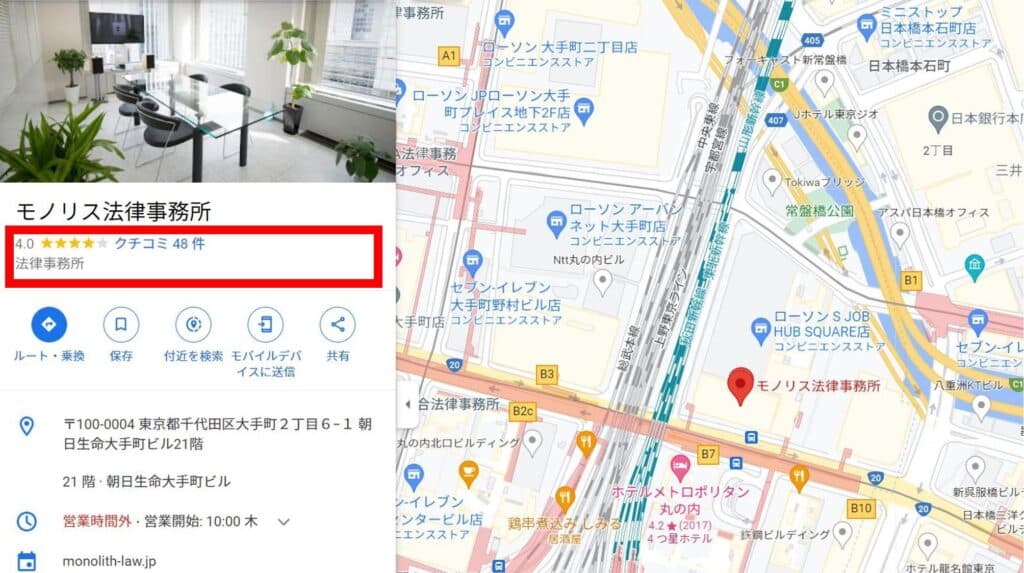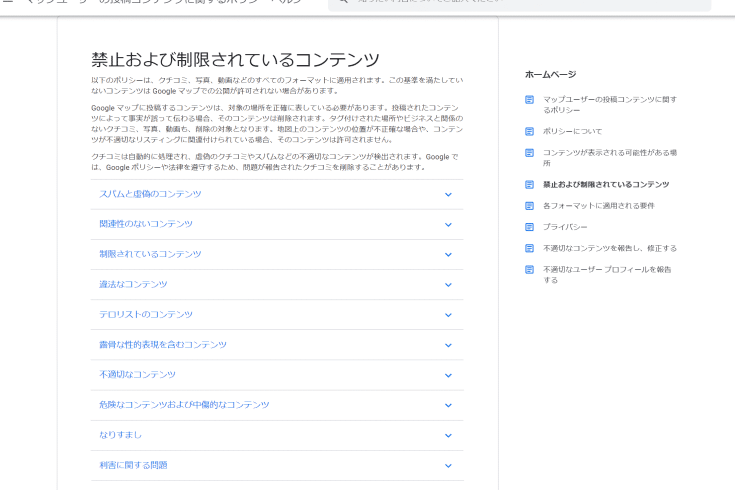How to Identify Individuals Posting Malicious Reviews on Google Maps

Google Maps is a map search service operated by Google LLC. Google Maps has a review posting feature, allowing users to freely post reviews and comments about facilities such as stores and hospitals.
However, if defamatory comments are posted as reviews, they can create a negative impression and potentially affect customer acquisition. Therefore, it is necessary to promptly identify the poster and remove the comment.
In this article, we will explain how to identify malicious reviewers on Google Maps.
What are Google Maps Reviews?

When you search for a facility or service name on Google, user-posted reviews are displayed.
For example, the search results for “Monolith Law Office” are displayed as follows, with the red frame indicating the review rating.
Examples of Malicious Reviews
The following are examples of malicious reviews posted on Google Maps.
- The attitude of nurse A at this hospital is too bad. She’s mentally ill.
- The staff B at this restaurant was extremely unattractive and lacked cleanliness. It was the worst.
For such reviews, if they are reported to the management and deemed to violate prohibited content, they may be removed. According to Google’s “Policy on User-Posted Content on Maps”, there are 10 items listed as “Prohibited and Restricted Content”.

Image Source: Google.llc “Prohibited and Restricted Content[ja]“
The above review examples may be removed as they fall under “Dangerous and Defamatory Content”.
However, not all reviews will be removed even if a violation report is made. If the review is not removed, or if a large number of malicious reviews are posted, consider identifying the poster.
Procedure for Identifying Google Review Posters

The process of identifying Google Maps review posters is as follows:
- Request for IP address disclosure
- Order or notification to prevent log deletion
- Request for disclosure of name and address
We will explain each step in detail.
1. Request for IP Address Disclosure
What is an IP Address?
An IP address is a number assigned to a device on a network. To post a review on Google Maps, you need a Google account, but you don’t need to register your real name when creating an account, so Google doesn’t have your personal information. To identify the poster of a review, you need to disclose the IP address.
Procedure for Requesting IP Address Disclosure
The request for IP address disclosure can be made through a provisional disposition, not a formal trial. While trials often take more than a year to reach a verdict, provisional dispositions are very speedy, with decisions usually made within 1-2 months. The average attorney fees for this process are:
A retainer fee of around 300,000 yen and a success fee of around 300,000 yen
Reference: https://monolith.law/reputation/reputation-lawyers-fee[ja]
In this procedure, it is possible to request both the disclosure and deletion of the IP address at the same time. The above fees cover both actions. However, the cost will naturally vary depending on the content and volume of the posts in question.
As Google LLC, the operator of Google Maps, is a company based in the United States, the counterparty in the procedure is a foreign corporation. Therefore, it is necessary to translate necessary documents and evidence into English and obtain the registration of a U.S. corporation, which will cost about 200,000 yen in addition to the regular attorney fees.
For more information on how to remove reviews, please refer to the following article:
https://monolith.law/reputation/google-map-reputation-delete-way[ja]
Proving the Illegality of the Post
If Google determines that a malicious review falls under “prohibited and restricted content,” it will be removed, even if the review is not illegal. On the other hand, to obtain an order to disclose the IP address, you need to provide legal arguments and evidence that the review is illegal.
2. Order or Notification to Prevent Log Deletion
If the request for IP address disclosure is granted, you can identify the provider used by the poster of the review from that IP address. Providers keep logs of IP address users for a certain period of time. Logs are records of computer usage, so by checking the logs, you can find out the content of the data and the date and time it was sent and received.
However, logs are deleted after a certain period of time. Therefore, you need to get an order to prevent the provider from deleting the logs.
To get this order, you need to start a new legal procedure. If you issue a notice saying, “We are going to request the disclosure of the name and address of the review poster, so please keep the logs until the disclosure order is issued,” the provider may keep the logs without deleting them.
Before starting a lawsuit, consider issuing a notice. This notice also requires specialized knowledge to create, so you should consult with a lawyer who is familiar with these procedures.
3. Request for Disclosure of Name and Address
Once you have issued a notice to save the logs, you will proceed with the procedure to request the disclosure of the name and address of the review poster. This request cannot be made through a provisional disposition. You need to go through a formal trial procedure.
Even if a critical review is posted on Google Maps, if the review is not intended to harass and the disclosure of the facts is in the public interest, the name and address of the poster should not be disclosed.
The court will carefully consider this through a formal trial procedure and will only issue an order to disclose the name and address if it recognizes the illegality of the post.
Actions You Can Take After Identifying a Google Review Poster

Once you have identified the author of a review posted on Google Maps, you can proceed with a claim for damages or a criminal complaint.
Claim for Damages
When an order to disclose the name and address is issued, the name and address of the subscriber of the internet line used by the poster will be disclosed. Once you know the name and address, you can claim for costs such as attorney’s fees and compensation for emotional distress.
However, there is a possibility that the poster may not be identified, or even if the poster is successfully identified, the attorney’s fees may exceed the compensation for damages. We explain this point in detail in the following article.
https://monolith.law/reputation/disclosure-of-ipaddress[ja]
Criminal Complaint
A complaint is when a victim of a crime reports the criminal act committed by the offender to the investigative authorities and requests punishment. Once the complaint is accepted, the police will investigate the facts of the complaint. As a result, if deemed necessary, the offender will be arrested or prosecuted. If the prosecution results in a guilty verdict in a criminal trial, the offender will be subject to criminal penalties.
Defamation (Japanese Penal Code Article 230): “A person who publicly states a fact and damages the honor of another person, regardless of the truth of the fact, shall be punished by imprisonment for up to three years or a fine of up to 500,000 yen.”
Damage to Credit and Obstruction of Business (Japanese Penal Code Article 233): “A person who spreads false rumors or uses deception to damage another person’s credit or obstruct their business shall be punished by imprisonment for up to three years or a fine of up to 500,000 yen.”
Forceful Obstruction of Business (Japanese Penal Code Article 234): “A person who uses force to obstruct another person’s business shall be punished in the same manner as the preceding article.”
Destruction of Computer and Obstruction of Business (Japanese Penal Code Article 234-2): “A person who damages an electronic computer or electromagnetic record used for another person’s business and obstructs that business shall be punished by imprisonment for up to five years or a fine of up to 1,000,000 yen.”
https://elaws.e-gov.go.jp/document?lawid=140AC0000000045[ja]
Summary: Consult a Lawyer for Identifying Individuals in Google Reviews

Google Maps is a very convenient map search service, but it can also be a platform for malicious reviews.
If the poster can be identified, it is possible to claim damages. However, there is also a possibility that the compensation received may not cover the legal fees.
The process of identifying the poster is not simple. If you are troubled by malicious reviews on Google Maps, it is recommended to consult with a professional lawyer who is knowledgeable about online defamation.
Category: Internet





















